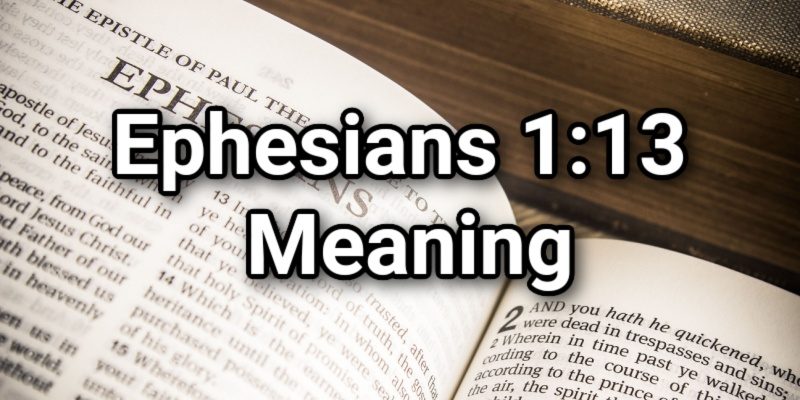Lord’s Library editors offer this Ephesians 1:13 meaning so you understand the “In whom ye also trusted” Bible verse.
Ephesians 1:13 is a key verse that details the significance of faith in Jesus Christ and the role of the Holy Spirit as a seal of salvation. It reads (in the King James Version): “In whom ye also trusted, after that ye heard the word of truth, the gospel of your salvation: in whom also after that ye believed, ye were sealed with that Holy Spirit of promise.” This verse is part of a larger passage where Paul explains the spiritual blessings bestowed upon believers by grace through faith in the finished Work of Christ.
In sum, Ephesians 1:13 emphasizes the transformative power of the Gospel of Jesus Christ and the assurance provided by the Holy Spirit.
The Apostle Paul‘s Letter to the Ephesians is a deep exposition of Christ’s nature and His followers. Ephesians 1 begins with a praise to God for the spiritual blessings in heavenly places in Christ. By the time Paul reaches verse 13, he has already established the grandeur of God’s eternal purpose and the centrality of Christ in God’s plan of salvation.
Ephesians 1:13 Meaning
The phrase “in whom ye also trusted” refers specifically to Christ, indicating the Ephesians’ faith response to the Gospel Message. This trust was not a vague belief but a committed, relational trust placed in Christ after hearing “the word of truth, the gospel of your salvation.” The word “also” suggests a common faith shared among the believers, including both Jewish and Gentile converts, highlighting the Lord’s universal call. See 1 Timothy 2:4:
- 1 Timothy 2:4: “Who will have all men to be saved, and to come unto the knowledge of the truth.”
The latter part of the verse, “ye were sealed with that Holy Spirit of promise,” identifies the Holy Spirit’s crucial role in the Christian’s life, post-salvation. In Biblical times, a seal was a legal mark of authenticity or ownership and protection. Thus, the sealing by the Holy Spirit signifies God’s ownership over the believer and the guarantee of their salvation and future inheritance.
The Holy Spirit’s presence in believers serves as a down payment or “earnest” of their anticipated redemption and glorification See Ephesians 1:14: “Which is the earnest of our inheritance until the redemption of the purchased possession, unto the praise of his glory.”
Ephesians 1:13 has serious theological implications. It speaks to the doctrine of salvation (soteriology), emphasizing faith in Christ as the necessary response to the Gospel. It also touches on pneumatology, the study of the Holy Spirit, presenting the Spirit as the seal and guarantee of the believer’s eternal inheritance. This sealing reassures believers of their secure position in Christ and the certainty of God’s promises, amen.
On a practitioner’s level, Ephesians 1:13 offers assurance of salvation to believers. Understanding that one is sealed by the Holy Spirit can provide peace and confidence amidst life’s uncertainties. This assurance often fosters an even deeper commitment to God and a greater willingness to live out one’s faith boldly.
This verse encourages believers to reflect on the nature of their faith as well; by prompting an examination of the sincerity and depth of one’s trust in Christ. It also challenges Christians to continually listen to and promote the Gospel—the “word of truth.”
In conclusion, Ephesians 1:13 encapsulates the transformative response to the gospel—trusting in Christ—and the subsequent divine affirmation through the sealing of the Holy Spirit. This verse not only underscores the personal and communal aspects of faith but also offers a comforting assurance of God’s permanent indwelling and protection through the Holy Spirit. For believers, it is a powerful reminder of their secure and cherished status in God’s overarching plan of redemption.
Lord's Library is a Christian resource hub. Our editors use a variety of internet research methods like search engines, audio and video, AI, consultations with ministry leaders in the field, and more. Lord's Library should never be a substitute for reading your Bible daily as the Scriptures are to be our final authority on all matters. Lord's Library participates in affiliate programs. We may make a small commission from products purchased through this resource.
- What Does the Bible Say About Discernment? With Key Scriptures - July 19, 2024
- What Does the Bible Say About Disobedience? With Key Scriptures - July 19, 2024
- 1 Timothy 1:12 Meaning: Commentary on an Important Scripture - July 11, 2024












